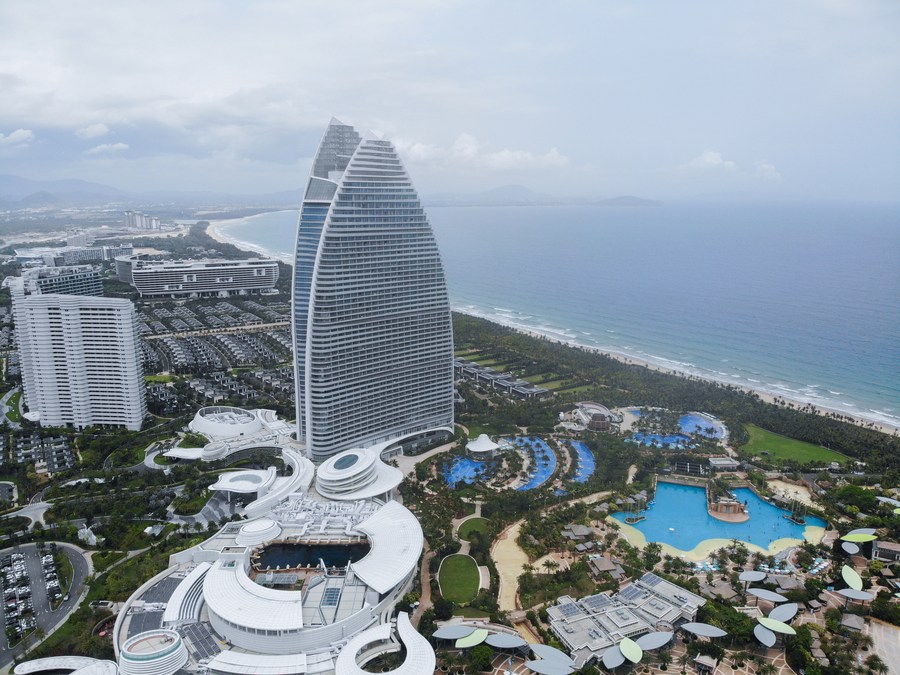

South China’s Hainan province, the first free trade port on the Chinese mainland, saw strong foreign investment growth in 2020.
Official data showed that paid-in foreign direct investment (FDI) into the island province surged 100.7 percent year-on-year to a record high of $3.03 billion in 2020.

Aerial photo taken on April 4, 2020 shows the Atlantis resort in Sanya, south China's Hainan Province. (Xinhua/Zhang Liyun)
In the same period, 1,005 foreign-invested companies were newly established in the island province, soaring 197.3 percent over the previous year. About 90 percent of all newly established foreign-funded companies were in the modern services sector and their actual use of foreign investment accounted for around 80 percent of all.
Eighty countries and regions had investment in Hainan last year, doubling the number in 2019, and the investors included G20 member countries.
The reason why Hainan holds appeal to FDI can be largely attributed to the advantages of the Hainan free trade port, explained Shen Danyang, vice governor of the province.
With supporting policy packages, the Hainan free trade port is becoming a popular destination for foreign enterprises. U.S. electric carmaker Tesla, which launched a project in the free trade port in October last year, is one of them.
On Jan. 15, Tesla opened its first sales and service center in Haikou, capital city of the province. Five days later, the giant’s new superchargers went into operation in the province.
Tesla will expand its self-run charging network and improve the supercharger deployment in the province, said Xu Yao, sales manager of Tesla’s Hainan market, adding that the company plans to extend its sales and service network on the island.
Hainan’s well-targeted policies to promote the development of new energy vehicles (NEVs) have brought opportunities for NEV manufacturers including Tesla and the whole industry, enhancing the company’s confidence in increasing investment in China, said Tao Lin, vice president at Tesla.
“Hainan will embrace new opportunities in areas like advanced technologies and low-carbon economy,” noted Fabrice Fourcade, senior vice president of EDF Group, and its chief representative in China, introducing that the company and its partners are cooperating with Hainan in clean energy and the construction of NEV infrastructure.
From signing a license contract with a local company in Hainan to opening five stores on the island province, Japanese convenience store chain operator Lawson Inc. took only a little more than two months to land its business in Hainan.
Tang Yaohua, general manager of Lawson’s local partner firm hailed the province’s better business environment, disclosing that the Japanese convenience store chain plans to open over 100 stores in Hainan.
At the end of last year, the Hainan free trade port signed 14 foreign-funded projects, covering sectors such as aviation, culture and sports, international settlement and fintech, attracting foreign companies including American multinational conglomerate General Electric.
China released a master plan for the Hainan free trade port on June 1, 2020, marking the start of construction of the port.
On Feb. 1, the 2020 negative list for foreign investment access in the Hainan free trade port took effect. The list lifts restrictions on foreign investment access to online data processing and online transaction processing businesses and allows overseas high-level universities and vocational colleges specializing in science and engineering, agriculture, and medicine to run on the island independently.
China will further shorten the negative list to gradually realize investment liberalization and facilitation in the Hainan free trade port, according to the country’s National Development and Reform Commission (NDRC).
“This year, China will roll out special measures to relax market access for the Hainan free trade port,” said Zhao Chenxin, secretary general of the NDRC.
 Fire brigade in Shanghai holds group wedding
Fire brigade in Shanghai holds group wedding Tourists enjoy ice sculptures in Datan Town, north China
Tourists enjoy ice sculptures in Datan Town, north China Sunset scenery of Dayan Pagoda in Xi'an
Sunset scenery of Dayan Pagoda in Xi'an Tourists have fun at scenic spot in Nanlong Town, NW China
Tourists have fun at scenic spot in Nanlong Town, NW China Harbin attracts tourists by making best use of ice in winter
Harbin attracts tourists by making best use of ice in winter In pics: FIS Alpine Ski Women's World Cup Slalom
In pics: FIS Alpine Ski Women's World Cup Slalom Black-necked cranes rest at reservoir in Lhunzhub County, Lhasa
Black-necked cranes rest at reservoir in Lhunzhub County, Lhasa China's FAST telescope will be available to foreign scientists in April
China's FAST telescope will be available to foreign scientists in April "She power" plays indispensable role in poverty alleviation
"She power" plays indispensable role in poverty alleviation Top 10 world news events of People's Daily in 2020
Top 10 world news events of People's Daily in 2020 Top 10 China news events of People's Daily in 2020
Top 10 China news events of People's Daily in 2020 Top 10 media buzzwords of 2020
Top 10 media buzzwords of 2020 Year-ender:10 major tourism stories of 2020
Year-ender:10 major tourism stories of 2020 No interference in Venezuelan issues
No interference in Venezuelan issues
 Biz prepares for trade spat
Biz prepares for trade spat
 Broadcasting Continent
Broadcasting Continent Australia wins Chinese CEOs as US loses
Australia wins Chinese CEOs as US loses